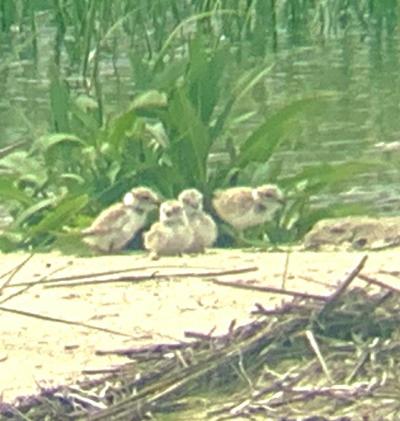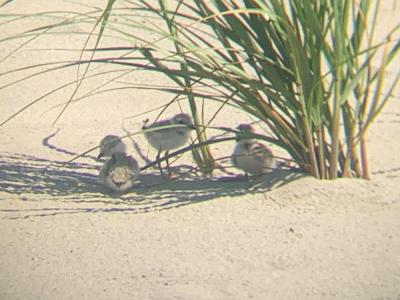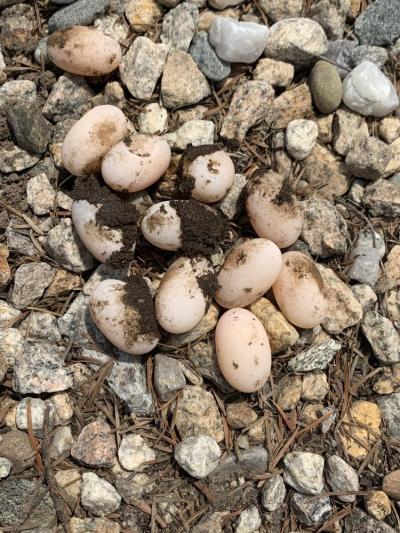At West Island in Fairhaven, extensive nest loss to predator(s) targeting nests has been the norm, with the metal exclosures have showing reduced success over time, including this year’s abandonment of an exclosed nest due to visitation, including coyote. The increase in habitat on the town beach this season, where all but one of the nests occurred, seemed to be an eventual buffet, and nest loss was again high. Coyote, frequently seen in daylight, were the primary predator of concern.
However, as sometimes occurs, one pair whose nest was lost in the low dune area, renested closer to the intertidal zone to evade predators. After tolerating frequent disturbance where adults were frequently off the nest due to a minimal fenced buffer on a narrow beach, this pair was rewarded with four hatchlings. All chicks (including one initially having a limp that hatched last) also fledged, with extensive cover in close proximity to the intertidal food source providing optimal chick habitat. This is the first hatching and fledging at West Island Town Beach since 2020, with the entire brood fledging, depicting the historical trend where fledge success rates are high on the island. While another late nest we hoped would also hatch was ultimately predated and egg loss rates were again high, this small success shows the island’s potential for plover success. Also in Fairhaven, a pair at Winsegansett Heights produced three fledges.
At Bakers Beach, while the famed parking lot pair didn’t succeed this season at a site where predator stress is also high and forced the pair to suddenly abandon late in the incubation period, the nearby pair did succeed, and also fully fledged. Like the West Island pair, they initially nested in the dunes but were predated by coyote, then renested on the beach where they succeeded. A possible factor in the successful hatch may have been a grey seal washed up near fencing (left alone to avoid a “take” from disturbing the pair) that deterred any predators from taking the chicks. This too is a success story, considering last season where all hatchlings were quickly lost.
For our newly acquired coastal pond sites, we can report some successes as well as some more predation events. Cockeast Pond and Richmond Pond near the Westport River, each had a pair that successfully produced hatchlings, with the Richmond Pond pair also producing three fledges. The brood had extensive habitat at the pond inlet and along the beach. The Cockeast Pond (aka Elephant Rock) pair unfortunately lost its brood to a predator, mostly likely a red fox that is regular to the area. For sites where predator exclosures have been frequently used, the nests hatching without the cages is notable.
At Salters Pond, one pair on “Pier Beach”, a small yet busy location, successfully hatched and produced three fledges, this site requiring some extra monitoring due to beach preparation with machinery for public use. At “South Beach” below the pond, a high density of six pairs nested, and all but one nest hatched on first attempt. But in contrast to West Island where a hatched nest is a rarity but hatchlings thrive, all chicks were quickly predated by some predator, likely again coyote. This is a continuation of recent year’s trends at Salters’ which has high potential as a productive plover site.
A special treat at Salters was the discovery of a nesting Diamondback Terrapin turtle, twelve eggs currently under protection. The nest will be visited in the weeks and months ahead, and the hatchlings released to the pond when they emerge.
As always, we thank the public for their cooperation and curiosity regarding the work, and hope to see you on the beach next year when the birds return!
by Lloyd Center Research Associate Jamie Bogart















